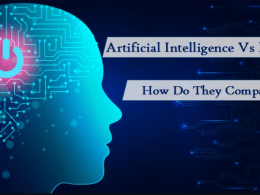The advent of artificial intelligence (AI) has ushered in a new era of digital transformation, influencing various sectors including the stock market and security systems.
This technological shift has introduced efficiencies and improvements unimaginable a few decades ago, profoundly shaping these sectors’ operational dynamics.
We will delve into the pivotal role AI plays in modernizing the stock market and security systems.
It explores how AI-driven financial prediction, high-frequency trading, market manipulation detection, and the bolstering of security systems through facial recognition, intrusion detection, and fraud prevention are revolutionizing these fields.
At the same time, the discussion touches on the challenges posed by these advancements, emphasizing the need for judicious utilization of AI to serve the best interests of humanity.
The Advent Of Modern Technologies In Stock Market And Security Systems
In today’s era, the implementation of artificial intelligence (AI) in the stock market and security systems is not merely a sci-fi idea but an emerging reality.
This development brings remarkable advantages, changing the landscape of trading, finance, and security.
In the same vein, it also prompts discussions about its impacts on these industries, both positive and negative.
AI-Driven Financial Prediction
AI’s impact on the stock market is massive, specifically in forecasting financial trends.
Machine learning (ML), a subset of AI, empowers algorithms to analyze vast amounts of data quickly, enabling the prediction of stock market trends with surprising accuracy.
For instance, predictive algorithms analyze past stock performance and market indicators to predict future trends and help investors make data-driven decisions.
Investors and financial institutions alike leverage AI-based predictive models to enhance their decision-making process.
With its ability to analyze historical data, current market trends, and even global economic indicators, AI generates accurate predictions. It does this by identifying patterns humans might overlook, considering the breadth and depth of the data it can process.
AI-Driven High-Frequency Trading
Another breakthrough AI brought to the stock market is high-frequency trading.
In this trading model, advanced algorithms execute thousands of transactions in fractions of a second. It’s a method that goes beyond human capabilities, given its speed and scale.
High-frequency trading systems powered by AI take advantage of minimal price differences in the stock market that would be almost impossible for humans to detect and react to in time.
These systems have the capability to assess market conditions, execute orders, and even modify strategies in real-time, ensuring they remain efficient and competitive in rapidly changing markets.
AI’s Role In Detecting Market Manipulation
AI also plays a crucial role in detecting market manipulation. By analyzing patterns in trading data, AI can help identify suspicious activities that indicate possible market manipulation.
Once these patterns are recognized, they can trigger alerts for further investigation, thereby enhancing regulatory oversight and ensuring fairer markets.
The Influence Of AI On Security Systems
Along with the stock market, the sphere of security systems also experiences significant transformation due to AI.
From personal to corporate security, AI brings new layers of protection, ensuring the safety of assets and data.
AI-Based Facial Recognition Systems
AI has propelled the advancement of facial recognition technology.
Deep learning algorithms are trained on millions of facial images, enabling them to identify and authenticate individuals with high precision.
This has profound implications for security systems, as it eliminates the need for traditional keys or access codes, replacing them with biometric data that is much harder to replicate or steal.
Moreover, AI-based facial recognition systems provide a more convenient, yet secure means of access control.
For businesses and institutions handling sensitive data, this advancement is a significant stride in data security and privacy protection.
Intrusion Detection Systems And AI
AI is also redefining intrusion detection systems (IDS). Traditional IDS have limitations, such as the inability to adapt to new threat patterns. AI, on the other hand, brings an adaptive learning component that enables the system to recognize new threats based on their similarity to known threats.
This is especially relevant in the context of cybersecurity, where AI can help identify and respond to cyber threats in real-time.
AI’s ability to learn from previous incidents and adapt accordingly makes it a formidable defense against cyber-attacks.
Unlike traditional security measures, AI-powered IDS can continually evolve, becoming more resilient to new threats and attack strategies.
AI In Fraud Detection And Prevention
In the context of financial security, AI’s impact is especially evident in fraud detection and prevention.
By analyzing data patterns, AI can identify irregularities that might indicate fraudulent activity. AI’s ability to process massive amounts of data in real-time makes it an invaluable tool in preventing fraud before it occurs, thereby safeguarding assets and preserving trust in financial systems.
Enhancing Risk Management Through AI
Risk management is an essential component in the finance sector, whether for trading stocks or ensuring system security.
AI has now become a game-changer, offering sophisticated tools to enhance risk management strategies.
AI For Credit Risk Assessment
AI has brought a new perspective to credit risk assessment. Traditional methods rely heavily on static data points, often leading to inaccurate risk evaluations.
AI, on the other hand, can analyze a more extensive range of variables, including dynamic data, to provide a more comprehensive risk profile.
Predictive Analysis For Operational Risk
AI’s predictive analysis capabilities have been leveraged to manage operational risks better.
AI models can predict potential disruptions or threats to operations by analyzing historical data and trends, allowing for preemptive measures and reducing unexpected losses.
AI In Cybersecurity Risk Management
AI also has a significant role in managing cybersecurity risks. With the increasing sophistication of cyber threats,
AI-based security systems can analyze vast amounts of data to detect anomalies, enabling quicker responses and preventing potential breaches.
AI, therefore, plays a vital role in fortifying digital defenses against ever-evolving cyber threats.
Closing Remarks
AI’s influence on the stock market and security systems is undeniable. It presents a powerful tool that drives efficiency, enhances decision-making, and increases security.
However, the use of AI also entails certain risks and challenges, such as data privacy and security issues.
It is, therefore, crucial for stakeholders to implement robust controls and maintain transparent practices.
As we continue to harness AI’s potential, we must strike a balance between its benefits and the challenges it poses, ensuring a future where AI serves humanity’s best interests.











